
WELCOME TO THIS BLOG, YOU CAN FIND ALL TYPES OF POETRY, POET HISTRY, POET BIOGRAPHY, TRIBUTES TO POETS, GHAZALS, POETRY CARDS, FRIENDSHIP POETRY, LOVE POETRY, ROMANTIC POETRY, BEST POETRY AND MUCH MOOR.


हम और बुलबुल-ए-बेताब गुफ़्तगू करते
पयामबर न मयस्सर हुआ तो ख़ूब हुआ
ज़ुबान-ए-ग़ैर से क्या शरह-ए-आरज़ू करते!
मेरी तरह से मह-ओ-महर भी हैं आवारा
किसी हबीब की ये भी हैं जुस्त्जू करते
जो देखते तेरी ज़ंजीर-ए-ज़ुल्फ़ का आलम
असीर होने की आज़ाद आरज़ू करते
न पूछ आलम-ए-बरगश्ता तालअ'ई आतश
बरसती आग, जो बारां की आरज़ू करते
(आतिश लखनवी)
ye aarzuu thii, tujhe gul ke ruu-ba-ruu karte
ham aur bulbul-e-betaab guftguu karte
payaambar na mayassar hua, to Khuub huaa
zubaan-e-Ghair se kyaa sharaH-e-aarzuu karte
meri tarah se mah-o-mahar bhii haiN aavaara
kisii habiib kii ye bhi haiN justujuu karte
jo dekhte terii zanjeer-e-zulf kaa aalam
asiir hone ki aazaad aarzuu karte
na puuchh aalam-e-bargashta taala'aii Aatash
barastii aag, jo baraaN ki aarzuu karte
Aatish
(Khwaja Haider Ali Aatish Lucknowi is one of the giants of Urdu literature who was born in 1778 and died in 1848. Aatish and Nasikh were contemporary poets whose rivalry is well-known. Both had hundreds of disciples. The era of Aatish-Nasikh was a golden era for Urdu poetry in Lucknow.)

Poetry is a
word of Greek origin. It comes from a verb with means “to
make, to create”. A poem is “something made or created”. The
poet is the creator and language is the material out of
which s/he creates his/her work of art.
Origins:
The precise origins of poetry are unknown. It is a very
ancient art which was born as an oral form and accompanied
by simple music and dance. it expressed what people regarded
as meaningful and memorable in their lives: natural
disaster, births and deaths, brave actions, dangerous
enemies, battles, etc.
It was often part of religious rites. Poets and listeners
enjoyed playing with words, choosing and arranging them to
produce music and meaning.
What a poem is:
Today poems exist in printed form, but the careful choice
and arrangement of words still account for the unique
quality of poetry.
Like other literary works poetry is made up of words. But
what is special about poetry? How is reading poetry
different from reading prose? A good start to answering the
question is to consider what poetry is concerned with:
poems.
A poem is a self-contained text, which makes sense as it
stands. It differs from prose most obviously because it is
written in lines whose length is decided by the author, not
the printer.
How the poem looks on the page, its visual
lay-out, is as important as its sound
quality. A poem makes intense use of language,
which results in a fare greater concentration of meaning
than is commonly found in prose.
Guidelines for reading Poetry:
In approaching a poem, you can ask the text some simple
questions which should help you to understand it:
- What is the poem about?
- Who is the voice speaking in the poem?
- To whom is the poem addressed?
- How is the poem written?
- Why has the poem been written?
Then… just enjoy it![]()
Nazeer Akbarabadi (real name "Wali Muhammad") was an Indian poet of 18th century who wrote Urdu ghazals and nazms under nom de plume "Nazeer". His father was Muhammad Farooq and his mother was the daughter of Nawab Sultan Khan who was the governor of Agra Fort. Agra, the Indian city, was known as Akbarabad after Mughal emperor Akbar at that time.
Nazeer's date of birth is not certain but most of his biographers believe that he was born in Delhi (then called "Dihli") in 1735 AD. The period of his birth coincided with the decline of the Mughal empire in India.
In 1739 Nazeer was still a child when Nadir Shah attacked Delhi and Muhammad Shah Rangeela was arrested. He was later released but countless people were mercilessly killed in Delhi. The horrors of this plunder were still fresh in the minds of people when 18 years later, in 1757 AD, Ahmad Shah Abdali attacked Delhi. People left Delhi for safer cities. Nazeer along with his mother and grandmother also abandoned Delhi and migrated to Akbarabad. At this time Nazeer was 22 years old.
It is said that Nazeer's poetic treasure consisted of about 200,000 verses but unfortunately a bigger portion of it is destroyed and only 6000 verses are available in printed form. No other Urdu poet used as many words as Nazeer did. Nazeer's poetry conveyed the plight of the common people in their own everyday language and was very popular among the masses. It was due to this lack of the "elite" element perhaps that Nazir's genius was not recognized until much later.
But in spite of this neglect, some of his poetic treasure is still available and some of his poems, such as Banjara Nama (chronicle of a nomad/gypsy), Kaljug nahin karjug hai yeh, Aadmi Naama (chronicle of man), etc., became immortal. Such poems find their place in school text books and discerning fans of Urdu poetry will not fail to recognize the greatness of Nazeer's verse.
He left for us about 600 ghazals, although his nazms are said to be more worthy of admiration. In fact, Nazeer's growing popularity is due to his nazms. He was purely a "People's poet" and his nazms reflected various aspects of the daily life of his age, all types of religious and social events with even minor details in which common people can be seen laughing, singing, teasing, playing.
He wrote nazams about religious and social festivals, such as Diwali, Holi, Eid, Shab-e-baraat, about fruits and about animals and birds, about seasons and even inanimate objects, such as paisa, rupaiaa, rotiyaan, aata-daal (meaning "flour" and "lentils"), "pankha" (meaning "fan") and "kakrhi" (a kind of cucumber). He wrote nazms about different aspects of human life, such as "muflisi" (Urdu word meaning "poverty") and "kohrinamah" (chronicle of a leper). The canvas of Nazeer's nazms is so vast that it encompasses all aspects of human behavior and every person can find nazms that can suit his taste.
Nazeer Akbarabadi's contemporaries were Mirza Muhammad Rafi Sauda, Mir Taqi Mir, Sheikh Qalandar Bakhsh Jurat, Inshallah Khan Insha, and Ghulam Hamdani Mushafi. He was young during the age of Sauda and Mir and might be a middle aged man during the age of Jur'at, Insha and Mushafi.
Though the era of modern nazm credits Altaf Hussain Hali and Muhammad Hussain Azad, Nazeer could arguably be considered Father of Urdu Nazm because he preceded them.
Nazeer died in 1830 AD, at 98.
Parveen Shakir represented an era. A bright student, popular in the company of such gifted friends as Shahida Hassan and Khushbakht Alia, she started writing verse at a young age, simultaneously devoting herself to the study of English and Urdu classics as well as modern literature, thereby enriching her knowledge and embellishing her diction.
Parveen Shakir also wrote prose, contributing weekly columns in Urdu, and articles in English. In addition, she was an established Mushaira ‘star’, captivating the audience by her pleasant recital without the use of melody. She exercised her talent in all genres of poetry, not neglecting free verse, and even the controversial ‘prose poem’, but Parveen emerges triumphant in ghazal.
Ghazal, a compact lyrical poem consisting of independent couplets and dealing with the themes of love, wine, life’s enigmas and cos mic mysteries, is the main offering at poetic functions. Parveen earned kudos as a ghazal writer, discovering the extra dimension of uplifting poetry, and feeling perfectly at ease with the conventions of prosody. Her rhythmic flow and polished wording blend nicely with music, enabling a vocalist to excel him or herself while rendering her couplets. Furthermore, a litmus test of a poet’s popularity is the number of times his or her lines are on the tip of everybody’s tongue. Ghalib, Iqbal and Faiz are among the most proverbially quoted poets. Young Parveen shyly rubs shoulders with these exalted bards as an oftrepeated modern versifier.

Mir Taqi Mir(b. 1723 - d. 1810), whose original name was Mohammed Taqi and takhallus was Mir was the leading Urdu poet of the eighteenth century, and one of the pioneers who gave shape to the Urdu language itself. He was one of the principal poets of the Delhi school of the Urdu ghazal and remains arguably the foremost name in Urdu poetry often remembered as Khuda-e-Sukhan meaning God of verse.
He was born in Agra, India (called "Akbarabad" at the time), which at the time was ruled by the Mughals, in 1723. He left for Delhi, at the age of 11, following his father's death. His philosophy of life was formed primarily from his father, whose emphasis on the importance of love and the value of compassion remained with him through his life and imbued his poetry. At Delhi, he finished his education and joined a group of nobility as a courtier-poet. He lived much of his life in Mughal Delhi. However, after Ahmad Shah Abdali's sack of Delhi each year starting 1748, he eventually moved to the court of Asaf-ud-Daulah in Lucknow, at the king's invitation. Distressed to witness the plundering of his beloved Delhi, he gave vent to his feelings through some of his couplets. He remained in Lucknow for the remainder of his life.
Mir's literary reputation is anchored on his ghazals. Mir lived at a time when Urdu language and poetry was at a formative stage - and Mir's instinctive aesthetic sense helped him strike a balance between the indigenous expression and new enrichments coming in from Persian imagery and idiom, to constitute the new elite language known as Rekhta or Hindui. Basing his language on his native Hindustani, he leavened it with a sprinkling of Persian diction and phraseology, and created a poetic language at once simple, natural and elegant, which was to guide generations of future poets.
After his move to Lucknow, his beloved daughter died, followed by his son, and then his wife. This, together with other earlier setbacks (including his traumatic stages in Delhi) lends a strong pathos to much of his writing - and indeed Mir is noted for his poetry of pathos and melancholy.
Mir made no secret of his attachments to young louts, and wrote of his passing fancy for Attar Ka Launda the son of a perfumer and Memar Ka Larka son of a mason.
While some historians have read into Mir's verse his own feelings and experiences, whether that be love for boys or love for women, others hold that "Such contradictory visions of Mir's life and times arise from the effort to extract from Mir's ghazals information that they simply do not contain."
What Mir was practicing was probably the Malamati or Blameworthy aspect of the Sufi tradition. Using this technique, a person ascribes to oneself an unconventional aspect of a person or society, and then plays out its results, either in action or in verse.
Mir was a prolific writer. His complete works, Kulliaat, consist of 6 dewans, containing 13,585 couplets comprising all kinds of poetic forms: ghazal, masnavi, qasida, rubai, mustezaad, satire, etc.
Mir's famous contemporary, also an Urdu poet of no inconsiderable repute, was Mirza Rafi Sauda.
He died in Lucknow, of a purgative overdose, on 20 September 1810.
Mir Babar Ali Anis (Urdu: میر بابر علی انیس) was a renowned Urdu poet. He was born in Faizabad in the northern Indian state of Uttar Pradesh in 1803 and died in 1874.
His father, Mir Khaliq who was a famous poet and litterateur, took personal interest in the education and upbringing of his son, and entrusted him to the care of reputed contemporary teachers, Mir Najaf Ali Faizabadi and Maulvi Hyder Ali Lucknavi. In addition, Anees's mother who was an educated and pious lady, played a significant role in shaping the personality of the boy poet. But above all, it was the boy's own instinctive urge for learning and literature that made him an accomplished poet, proficient in Arabic, Persian and Islamic scriptures, and well-versed in logic, literature and philosophy. Poetry came to him as ancestral heritage, for his forbears, going back to his great grandfather, were eminent poets and men of letters. Anees was the grandson of Mir Hasan who is remembered for his immortal Masnavi, Sehir-ul-Bayaan. His parents had migrated in their old age to Lucknow, where he spent the best part of his life.
Anees had started writing poetry quite early in his life right at Faizabad, though he perfected his art in Lucknow under the supervision of Imam Baksh Nasikh. In keeping with the popular trend, he first tried his hand at the ghazal, but failing to make much headway in this sphere, he changed over, under the advice of his father, to the writing of marsias, in which domain he soon established a high reputation, equalled (sometimes) by his poetic compare, Salamat Ali Dabir. Anees broadened the scope of this genre by including in its body, in addition to the customary lamentation and mourning, realistic scenes of the battlefield, graphic delineations of the hero's face and figure, lively portrayals of the emotional states of the combatants, accurate descriptions of the landscape, and occasional interludes of moral edification. Anees was a master of simple, natural utterance, with a superb command on the language, which was always adequate to express a large variety of moods, scenes, characters and situations. He is specially notable for presenting the same scene or situation, over and over again, in different words or phrases, without letting it appear monotonous. Besides being a master of the marsia, Anees was also a specialist of the rubai, the shortest complete poem in Urdu, containing only four lines. Anees died in 1874 at the age of 71.
Brief Note on the Marsia: The marsia, strictly speaking, is an elegiac poem written to commemorate the martyrdom and valour of Hazrat Imam Hussain and his comrades of the Battle of Karbala. In its form the marsia generally consists of six-line units, with a rhyming quatrain, and a couplet on a different rhyme. This form found a specially congenial soil in Lucknow (a city in Northern India), chiefly because it was the centre of Shia Muslim community, which regarded it an act of piety and religious duty to eulogise and bemoan the martyrs of the battle of Karbala.
Mirza Asadullah Beg known to posterity as Ghalib, a nom de plume he adopted in the tradition of all classical Urdu poets, was born in the city of Agra, of parents with Turkish aristocratic ancestry, on December 27th, 1797. As to the precise date, Imtiyaz Ali Arshi has conjectured, on the basis of Ghalib's horoscope, that the poet might have been born a month later, in January 1798. When he was only five years old, his father, Abdullah Beg Khan died in a battle while working under Rao Raja Bakhtwar Singh of Alwar and his uncle Nasrullah Beg Khan took charge of him. But he lost his uncle also at the tender age of eight.
The death of his father and uncle during his early youth left Ghalib with no male-dominant figures. He then moved to Delhi.
Ghalib's early education has always been a matter of confusion. There are no known records of his formal education, although it was known that his circle of friends in Delhi had some of the most intelligent minds of the time.
Around 1810, he was married into a family of nobles, at the age of thirteen. He had seven children, none of whom survived (this pain has found its echo in some of Ghalib's ghazals). There are conflicting reports regarding his relationship with his wife. She was considered to be pious, conservative and God-fearing while Ghalib was carefree, unconventional, and arguably, not very religious in the strict sense of the word.
Ghalib never worked as such for a livelihood. He lived on either state patronage, credit or the generosity of his friends. His fame came to him posthumously. He had himself remarked during his lifetime that although his age had ignored his greatness, it would be recognized by later generations. History has vindicated his claim. He also is arguably the most "written about" of all Urdu poets.
Although Ghalib wrote in Persian as well, he is more famous for his ghazals written in Urdu. It is believed he wrote most of his popular ghazals by age nineteen. His ghazals, unlike those of Meer Taqi Meer, contain highly Persianised Urdu, and are therefore not easily understood or appreciated by a vast majority of people without some extra effort. Numerous elucidations of Ghalib's collection of ghazals have therefore, been written by Urdu scholars. The first such elucidation or Sharh was written by Ali Haider Nazm Tabatabai of Hyderabad during the rule of the last Nizam of Hyderabad. Before Ghalib, the ghazal was primarily an expression of anguished love; but Ghalib expressed philosophy, the travails and mysteries of life and wrote ghazals on many other subjects, vastly expanding the scope of the Ghazal. This, together with his many masterpieces, will forever remain his paramount contribution to Urdu Poetry and Literature.
In keeping with the conventions of the classical Ghazal, in most of Ghalib's verses, the identity and the gender of the beloved is indeterminate. The beloved could be a beautiful woman, or a beautiful boy, or even God. As the renowned critic/poet/writer Shamsur Rahman Faruqui explains, since the convention of having the "idea" of a lover or beloved instead of an actual lover/beloved, freed the poet-protagonist-lover from the demands of "realism", love poetry in Urdu from the last quarter of the seventeenth century onwards, consists mostly of "poems about love" and not "love poems" in the Western sense of the term. Ghalib's poetry is a fine illustration of this. Ghalib also excels in deeply introspective and philosophical verses.
The first complete English translation of Ghalib's love poems (ghazals) was written by Sarfaraz K. Niazi and published by Rupa & Co in India and Ferozsons in Pakistan. The title of this book is Love Sonnets of Ghalib and it contains complete roman transliteration, explication and an extensive lexicon.
Not only Urdu poetry but the prose is also indebted to Mirza Ghalib. His letters gave foundation to easy and popular Urdu. Before Ghalib, letter writing in Urdu was highly ornamental. He made his letters "talk" by using words and sentences as if he were conversing with the reader. According to him "sau kos se ba-zaban-e-qalam baatein kiya karo aur hijr mein visaal ke maze liya karo" [ from hundred of miles talk with the tongue of the pen and enjoy the joy of meeting even when you are separated] His letters were very informal, some times he would just write the name of the person and start the letter.
He himself was very humorous and also made his letter very interesting. He said "main koshish karta hoon keh koi aisi baat likhoon jo parhay khoosh ho jaaye" [ I want to write the lines that whoever reads those should enjoy it] When the third wife of one of his friends died, he wrote... "Allah allah aik woh log hain jo teen teen dafah iss qaid say chhoot chu-kain hain aur aik hum hain keh aik ag-lay pachas baras say jo phansi ka phanda ga-lay mein parha hai to nah phanda hi tut-ta hai nah dum hi nikalta hai" [Allah Allah, there are some among us who have been freed from this prison three times and I have for the past 50 years this rope around my neck; neither this rope breaks nor it takes my life] Some scholar says that Ghalib would have the same place in Urdu literature if only on the basis of his letters.They have been beautifully translated into English by Ralph Russell, The Oxford Ghalib.
He died in Delhi on February 15th, 1869.

Munir Ahmad, better known as Munir Niazi, SI (1928-2006) was one of the best-known and admired Urdu poets from Pakistan who also produced good poetry in the Panjabi language.
Niazi was born in Khanpur on 19 April 1928, a village near Hushiyarpur, India. He was initially educated at Khanpur and after the partition of India he migrated to newly independent Pakistan and settled in Sahiwal, where he passed his matriculation. He earned an intermediate degree from S.E. College, Bahawalpur and a B.A. from Diyal Singh College in Lahore, Pakistan.
Munir Niazi launched a weekly, Saat Rang, from Sahiwal in 1949. He wrote numerous songs for films and made his name as the foremost movie song writer of Pakistan. He also wrote for newspapers, magazines and radio. In 1960 he established a publication institute, Al-Misal. Lately he was associated with Lahore Television and lived in Lahore till his death.
Taiz Hawa Aur Tanha Phool, Jungle mein Dhanak, Dushmanoon Kai Darmiyan Sham and Mah-e-Munir are his popular Urdu publications. In Punjabi he has published Safar di Raat, Char Chup Cheezan and Rasta Dasan Walay Tarey. His effective imagery conveys pictures in few words. He has experimented with poetic forms and has tried to create a new style, rhythm and diction in Urdu poetry. Innocence, mythology, nostalgia, dreams, eroticism, and romance are some of his most common themes.
Munir Niazi died of respiratory illness on 26 December 2006 in Lahore.


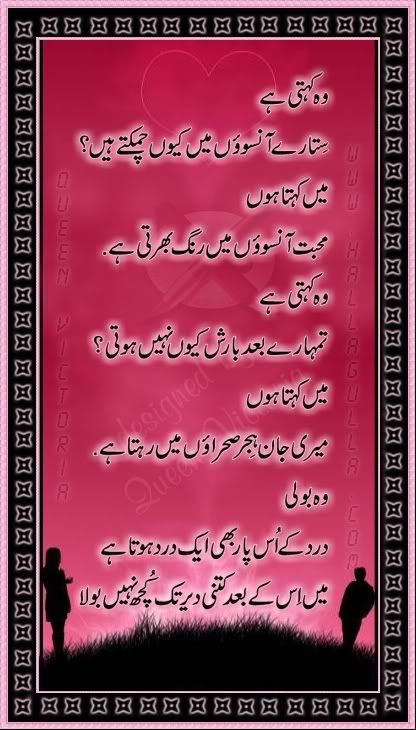 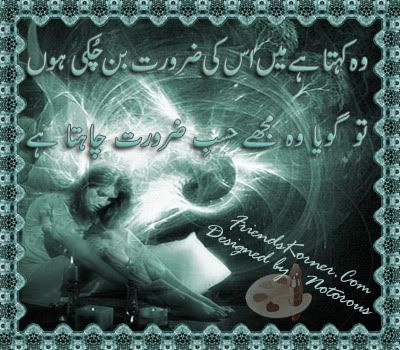 Tum Ho 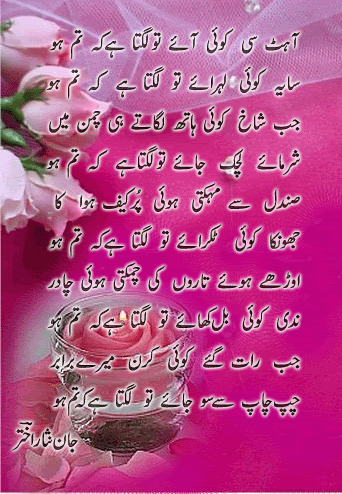 Mohabbat Thehar Jati Hai 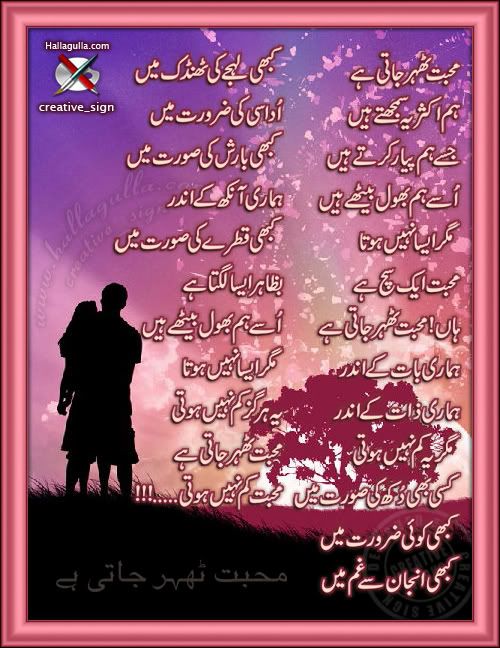 Yaaad 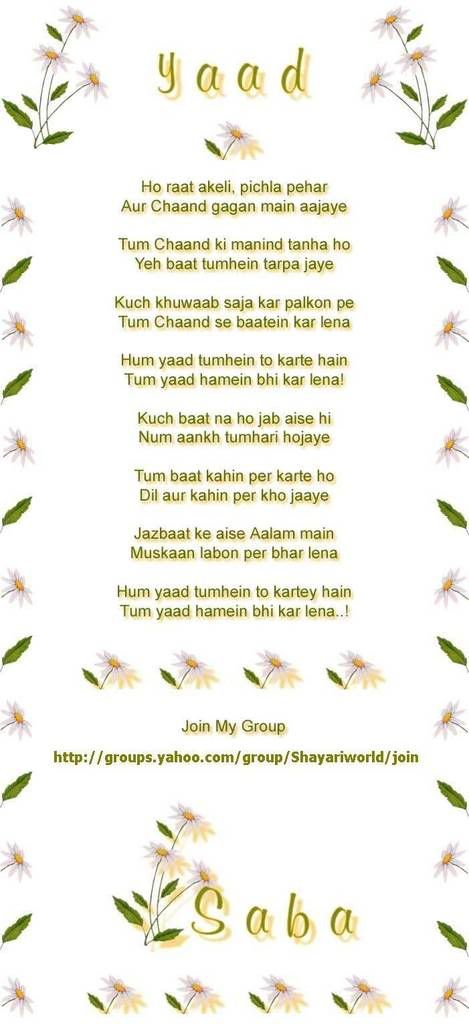
Khobsurat Nazam  Ageeb Tha Wo     Karrb   Ae Kash
Ho Sakta Hai
Kabhi Aanssoo
|
